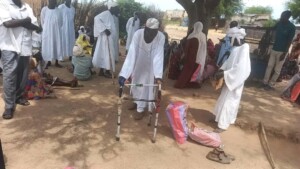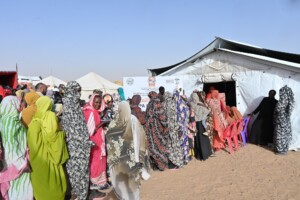Sudan, UN sign counter-terrorism travel MoU
The United Nations Office to Combat Terrorism and the Sudanese government signed a Memorandum of Understanding (MoU) in an online ceremony on Wednesday, that aims to implement the UN’s Counter-Terrorist Travel Programme.
 Khartoum airport (File Photo)
Khartoum airport (File Photo)
The United Nations Office to Combat Terrorism and the Sudanese government signed a Memorandum of Understanding (MoU) in an online ceremony on Wednesday, that aims to implement the UN’s Counter-Terrorist Travel Programme.
Sudan’s Ministry of Foreign Affairs said that due to the worldwide isolation policy to combat the spread of Covid-19, a direct meeting was impossible, so it was conducted by internet link. The memorandum began to be signed on Tuesday and was completed on Wednesday morning within the USA and the United Nations.
Ambassador Omar Siddig, Permanent Representative of Sudan to the UN signed in New York on behalf of the government of Sudan, and Vladimir Ivanovich Voronkov, UN Under-Secretary-General and Head of the UN Office for Counter-Terrorism, also signed the document.
The main purpose of this MoU is to provide a framework that defines the scope and forms of cooperation between the two parties.
The ministry said in a press statement on Wednesday that the signing of the MoU signals the beginning of the implementation of a large and integrated project in the field of civil aviation and travel in general to combat terrorism.
The estimated cost of the technical assistance package (hardware, equipment, specialised software, training, and capacity building programmes) to be provided to Sudan is approximately $45 million.
The MoU defines the support provided by the United Nations in combating the travel of terrorists in implementing the Sudan project in the following four areas: (i) Setting the necessary legislative frameworks to regulate the collection, use, transfer, retention and sharing of passenger data, in line with internationally recognised standards and human rights; (ii) the institutional structure of the Sudanese Detection Centre, also known as the Passenger Information Unit (PIU), to identify known and suspected terrorists, including developing standard operating procedures and training; (iii) Close cooperation with the transportation industry sector to ensure technical connectivity; (iv) Technical support, including donation and deployment of the United Nations go-travel software system.
Radio Dabanga’s editorial independence means that we can continue to provide factual updates about political developments to Sudanese and international actors, educate people about how to avoid outbreaks of infectious diseases, and provide a window to the world for those in all corners of Sudan. Support Radio Dabanga for as little as €2.50, the equivalent of a cup of coffee.












 and then
and then